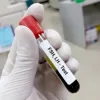Lifestyle & Nutrition: the solution for hormone-related infertility
Hormones are special chemical messengers in our body. They are made by the endocrine glands and travel through the bloodstream to all organs and tissues telling them what to do. Our environment and lifestyle have a huge effect on our hormonal balance. In fact, lifestyle and dietary changes can help prevent up to 70 percent of hormonal imbalances.
Endocrine disruptors
Endocrine disruptors alter the normal functioning of hormones by mimicking the action of hormones. A wide range of substances, both natural and man-made, are thought to cause endocrine disruption.
“Endocrine disruptors may be found in many everyday products– including plastic bottles, metal food cans, detergents, flame retardants, food, toys, cosmetics, and pesticides. NIEHS supports studies to determine whether exposure to endocrine disruptors may result in human health effects including lowered fertility and an increased incidence of endometriosis and some cancers. Research shows that endocrine disruptors may pose the greatest risk during prenatal and early postnatal development when organ and neural systems are forming.” (NIH, 2019)
Xenoestrogens, in particular, are a type of endocrine disruptors that mimic oestrogen. These are not biodegradable and are stored in the fat cells of the body. They have been associated with several conditions including breast, prostate and testicular cancer, early onset puberty, obesity, infertility, miscarriages and diabetes.
Polycystic ovary syndrome (PCOS) is the most common hormonal disorder among women of reproductive age. Several factors like genetics, unhealthy eating habits, lack of exercise and pollution play a role in the development of PCOS. Lifestyle and behavioural changes form the basis of management in these women and often they need to seek help from a fertility specialist for conceiving.
Too much stress, lack of sleep, irregular working hours can cause hormonal imbalance. Our body is accustomed to a biological clock and needs proper rest and care.
How to treat hormonal imbalance?
Certain lifestyle changes like eating a healthy balanced diet, choosing locally grown organic foods, avoiding consumption of fast food and packaged food, reducing the use of plastic where possible, avoiding creams and cosmetics that have chemicals can help in restoring hormone balance. Also, adequate and regular exercise, healthy and timely sleep habits, stress management plans an important role.
Apart from fertility treatment, the IVF London team of experts can help you manage hormonal imbalance through nutrition, changing habits & addictions, adjusting your environment, managing emotions and living an overall healthy life. Schedule your first initial consultation with us or attend one of our open evenings.






